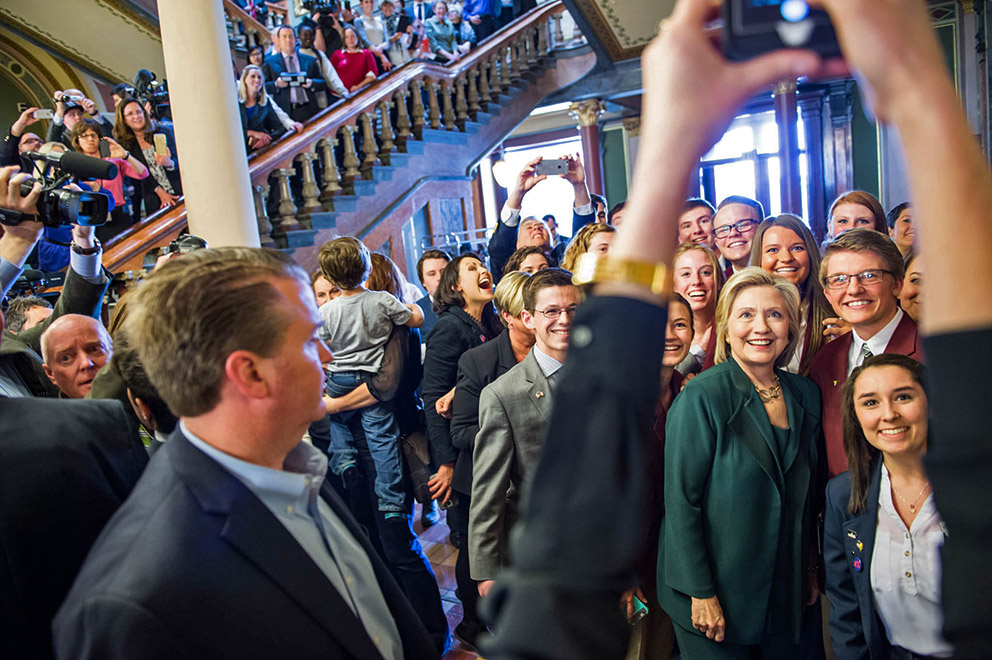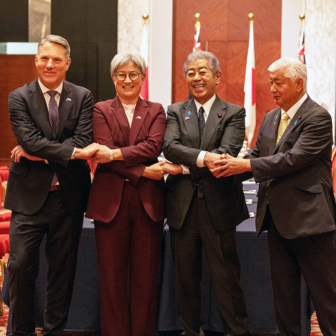Although the US presidential election is still eighteen months away, every day brings a new candidate. What’s clear is that the campaigning in the lead-up to primaries in the first half of 2016 will be a lopsided affair. Hillary Clinton is effectively the sole contender for the Democrats, but a plethora of candidates is beginning to battle it out for the Republican nomination.
It’s not certain whether Clinton’s dominance is a consequence of an unstated Democrat consensus that, having lost to Obama in 2008, it’s now “Hillary’s turn,” or whether other potential candidates are intimidated by her stellar qualifications and campaign machinery. If she falters or is forced to quit her campaign as a consequence of illness or misdemeanour, who stands outside the ring ready to step into the Democrats’ corner?
Clinton’s only declared opponent is Vermont senator Bernie Sanders. As a self-nominated socialist, he doesn’t stand a chance, and he knows it. His campaign is more about getting his ideas in the mix than about winning. And he could certainly enliven the debates. He is an outspoken opponent of the Trans-Pacific Partnership free-trade agreement, which Clinton once backed but now gives only equivocal support. More importantly, he’s a high-profile proponent of an increase in the minimum wage, greater income equality and other issues that matter to voters.
With surprising early fundraising success (US$2 million within forty-eight hours of announcing his candidacy), Sanders may well be able to create a constituency and change the debate. He doesn’t have to win to achieve success. If he can build support for ideas like a generous social safety net, progressive taxation and protection for labour then this will moderate other candidates’ positions, especially Clinton’s.
The array of potential Democrat candidates resembles a group of penguins on an icefloe, waiting for the first to enter the water. These include Lincoln Chafee – a one-time Republican who was elected governor of Rhode Island as an independent and then became a Democrat – and former Virginia senator Jim Webb. Former Maryland governor Martin O’Malley also seems to be assessing his chances. These men are all hindered by a lack of public recognition.
The most mentioned candidate is first-term Massachusetts senator Elizabeth Warren, a former academic and energetic champion of consumers and workers, who has vowed she will not run. Still, like Sanders, she will inevitably shape Clinton’s campaign, forcing her to pay attention to consumer and labour issues. She may very well be planning to be a broader influence on the general campaign. Reporter Ryan Lizza has called her “the virtual candidate.”
Warren’s current strategy seems designed to ensure that the positions Clinton adopts during the Democratic presidential primary are carried into office. A Warren advisor has been quoted as saying that “she can get Hillary to do whatever the hell she wants. Now the question is, will Hillary stick to it if she gets in? But at the moment Elizabeth can get her on record and hold her feet to the fire.”
The list of announced and putative Republican candidates, meanwhile, is large and continues to grow. Senator Ted Cruz was first to announce, in March. He’s the favourite of the hardcore conservatives and Tea Partiers who worry that Rand Paul is too dovish on foreign policy. His early start gives him money and visibility, but he has some serious weaknesses, in particular his willingness to thumb his nose at his own party, which undermines his more general appeal among likely Republican supporters.
Cruz’s rival for the conservative vote is senator Rand Paul, who must be considered a viable, if somewhat unorthodox, candidate for GOP nominee. He’s relatively permissive on drugs and same-sex marriage, passionate about civil liberties, and restrained on foreign policy, positions that place him well with younger voters. He is a beneficiary of good name recognition and a voting base bequeathed to him by his father, three-time presidential candidate Ron Paul.
Although senator Marco Rubio, who announced his candidacy on 13 April, enjoys both establishment and Tea Party support, he is struggling to be seen as the top-rung candidate by either faction. He could come through as everyone’s second choice. His appeal to the growing population of Hispanic voters, who will be a key voting faction in 2016, extends little further than those who share his Cuban heritage and more conservative approaches to immigration reform. He is a fierce critic of Barack Obama’s move to normalise relations with Cuba.
Other announced candidates with smaller chances are Mike Huckabee, a favourite of evangelical Christians, who ran in 2008 and will struggle to prove he is still relevant in 2016; Ben Carson, an African American who was born in poverty and became a neurosurgeon, but whose thought processes and policies are as incoherent as Herman Cain’s in 2012; and Carly Fiorina, who was CEO of Hewlett-Packard until she was unceremoniously deposed by the company’s board for poor performance. Fiorina’s only political experience is a failed and very expensive tilt at Barbara Boxer’s Senate seat in 2010; she is positioning herself as the candidate to beat Hillary Clinton and some Republican strategists will find it useful to have a woman on hand to criticise Clinton.
The raft of other possible candidates includes Wisconsin governor Scott Walker (who is very likely to throw his hat in the ring and must be considered to have a good shot at the nomination), New Jersey governor Chris Christie (who really must now be considered “damaged goods”), and Texas governor Rick Perry (who needs to establish he’s learned much more about campaigning since his tilt in 2012). And then there are the teasers – Donald Trump, Rick Santorum, Sarah Palin – and, of course, Jeb Bush.
Bush, son and brother of former presidents, and former governor of Florida, will almost certainly run. He’s being pushed by establishment Republicans, major Wall Street donors, and his own family. He polls well and fundraises successfully, but has kept a low-key, almost diffident, profile and so doesn’t dominate the field the way Clinton does. He and Rubio could find themselves competing for the same voters and the same donors in their home state of Florida.
This stable of GOP candidates is united on only two issues – their antagonism to Hillary Clinton and the need to raise a lot of money. The 2016 presidential campaign is predicted to cost US$5 billion, almost twice the 2012 campaign. Most of this will come from large donors, who must be wooed as aggressively as voters before attention can turn to policies and stump speeches. The large number of candidates in the primary makes the competition on the money trail even tougher for Republicans. Clinton has no such problems; while she may not have totally clear air when it comes to policy positions, she really has sole access to Democrat donors.
The billionaire Koch brothers will be major kingmakers in 2016. They are being bolder than ever in their attempts to mould the political process to their own philosophies by investing astonishing amounts of money (estimated to total US$890 million) to help ensure GOP contenders back the policies they want, and win.
So far, they are keeping their options open by expressing support for Scott Walker, Jeb Bush, Marco Rubio, Ted Cruz and Rand Paul. “Those are the ones we have talked to the most and who seem to be the possible leaders,” Charles Koch has said. None of the likely candidates is a perfect fit for the Kochs though. While Cruz and Paul are closest to the brothers on economic and foreign policy, the Kochs are being pragmatic and holding off making a single pick prior to the primary.
The other big money player is Sheldon Adelson, who will probably spend more than US$100 million in this campaign. In recent weeks, candidates have made the pilgrimage to his Las Vegas hotel to compete in what is referred to as the Sheldon Adelson primary. At this point Marco Rubio has emerged as the clear favourite because of his hawkish views and unwavering support for Israel. This could change if Rubio fails to look like a winner: having backed Newt Gingrich in 2012, Adelson’s advisers say he’s determined to get behind a more mainstream candidate who has a better chance of becoming the Republican nominee.
Aside from fundraising, there are some other essential rituals for candidates. The Taxpayer Protection Pledge maintained by Grover Norquist’s group, Americans for Tax Reform, has been signed by the majority of Republicans running for federal office since 1986. Rand Paul and Ted Cruz are the first two 2016 GOP presidential candidates to sign this pledge, promising to oppose or veto any proposal to raise taxes if they win the White House. Jeb Bush has said he won’t sign the pledge because his record on tax cuts is clear.
The other ritual involves getting known in the early voting states that play a critical role in the nominating process. Campaigns are rushing to make inroads with these primary voters, who traditionally demand personal interaction and unceasing attention. Already the candidates and possible candidates are spending time in New Hampshire and Iowa, where GOP rivals are testing new lines of attack on Clinton and each other.
The Republicans are attacking Clinton on Benghazi, on the secretive use of a personal email account during her time at the State Department, and on the foreign funds that the Clinton Foundation has accepted. They have even used her husband’s infidelity to disparage her. The only person the Republicans dislike more than President Obama is Hillary Clinton – this despite the fact that their animosities will alienate African Americans and women. “This isn’t a third term of Bill Clinton – this is a third term of Barack Obama,” Scott Walker has said.
Despite these attacks, Clinton is doing well in the early opinion surveys. In a series of polls conducted in April, she beat all potential GOP candidates, with her margin over Bush ranging from 4 to 17 points. A more recent poll, released on 4 May, showed that her unfavourable rating has increased six points since March. But despite this hit, she is the only 2016 candidate the poll tested who doesn’t sport a negative favourable/unfavourable rating, and she leads all the Republican top-tier candidates in hypothetical general election match-ups. The Republican presidential candidate in the poll who comes closest to Clinton is Rand Paul (47 per cent to 43 per cent).
It’s a long, expensive road to the primaries and a lot can happen. But as it currently stands, there’s a very real risk for the Republicans that 2016 will be a repeat of 2012. This time it will likely be Jeb Bush, not Mitt Romney, who will spend endless time and resources battling GOP candidates supported by vocal and well-funded political constituencies but lacking wide voter appeal. Regardless of who emerges as the nominee, he or she and the party will be damaged by this toxic process. This should mean that Clinton will cruise to victory. But that’s a big assumption to make in May 2015. •




